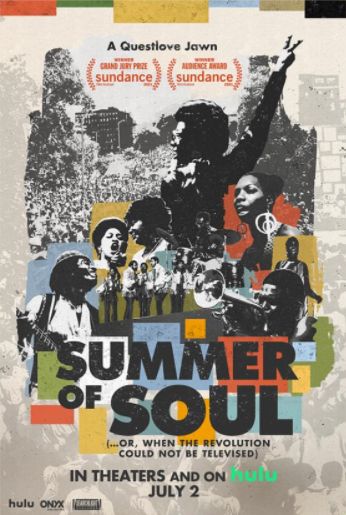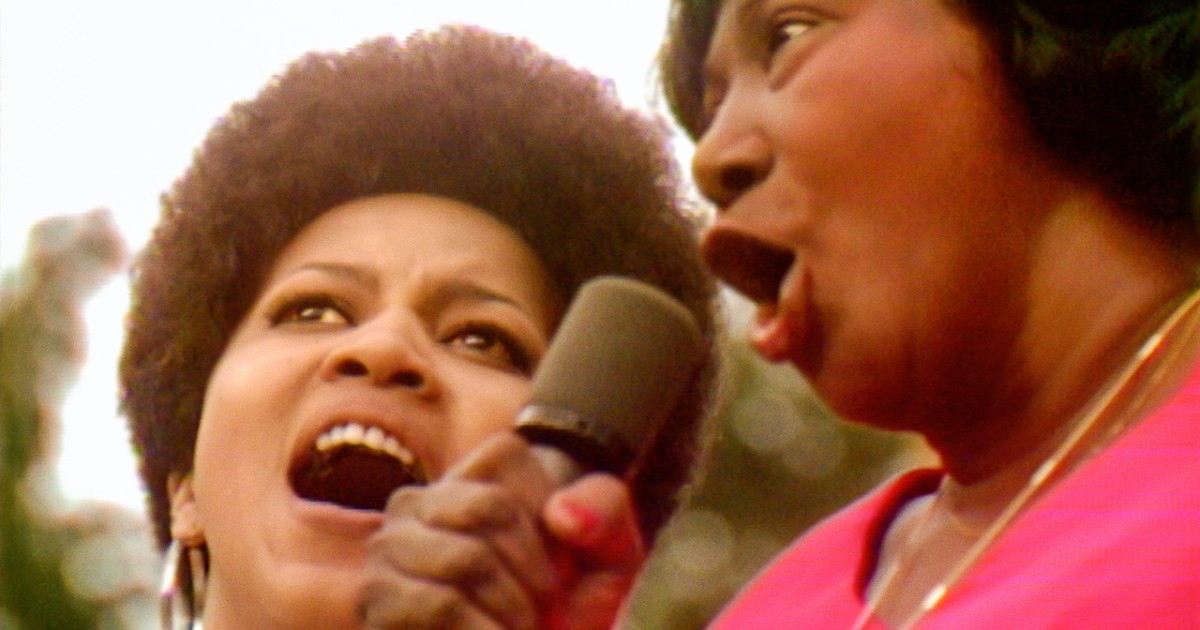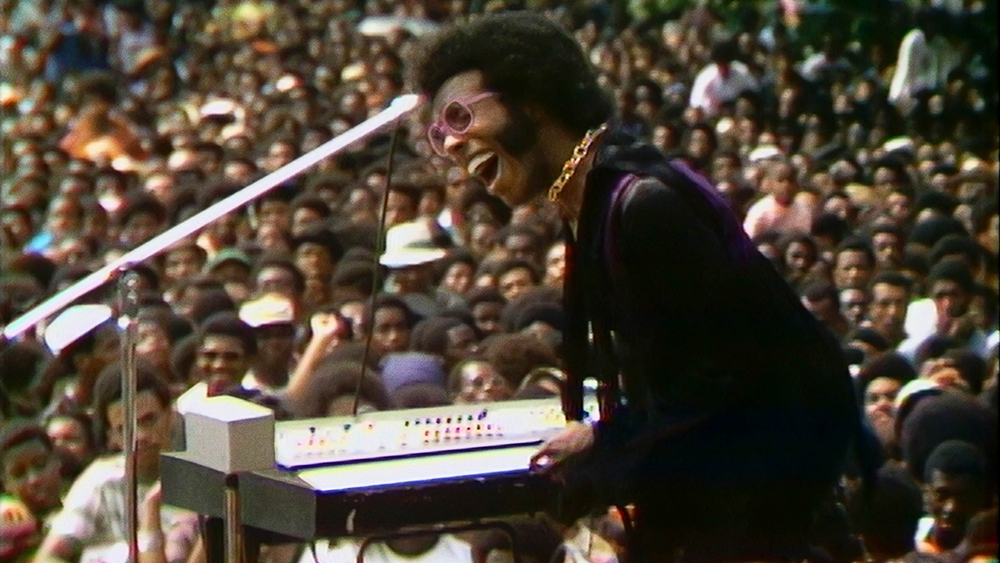Doc Corner: 'Summer of Soul' opens Sheffield DocFest
 Wednesday, June 9, 2021 at 3:30PM
Wednesday, June 9, 2021 at 3:30PM Sheffield DocFest runs from June 3-14. There are virtual selections available at their website. This is their opening night film.
 by Glenn Dunks
by Glenn Dunks
“The Black Woodstock” goes the elevator pitch for Summer of Soul (…Or When the Revolution Could Not Be Televised), a high-spirited documentary about the Harlem Cultural Festival of 1969. “The Black Woodstock” was also the last-ditch effort of a title given by Hal Tulchin to a film he had made about the festival as he attempted to sell it to distributors and networks that had repeatedly turned it down even in the wake of the Oscar-winning success of Woodstock. Nobody wanted Tulchin’s film, which is a ridiculous idea in hindsight. Of course, it is hardly a surprising one for all the reasons you would expect.
Tulchin passed away in 2017 at age 90 and so never got to see Summer of Soul, the final product that has been directed by Ahmir-Khalib Thompson (aka Questlove). That is a shame. I suspect he would have loved it...
Not just because the film itself is a rollicking rock-and-roll good time, but because it holds the achievement of the Harlem Cultural Festival in such incredibly high esteem.

The festival was held over six weekends on the lawns of Mount Morris Park in Harlem, which stretches five blocks of the then predominantly black Manhattan neighbourhood. Each week’s concert was themed (gospel, for example) and Tulchin smartly figured he should film such a gathering for prosperity. That footage makes the bulk of Summer of Soul, but Questlove has used this opportunity (his first as a director) to not just string together the material filmed over those six weeks. Rather, he has used it to explore what made those six weeks so special in the first place. He uses interviews with performers (Gladys Knight, Mavis Staples, members of Fifth Dimension) as well as those who were lucky enough to be in the audience, and contemporary cultural icons (Chris Rock, Lin-Manuel Miranda).
While I do not know the film that Tulchin produced, Questlove presumably goes further into the event’s political context amid a summer of racial tension and violence. In one of its best sequences, archive footage does news reporters asking attendees what they though about the moon landing that was happening to which the consensus is clear: it meant very little when there is racial inequality, mass hunger and police brutality. Much as it ever was, sadly. While the talking heads don’t add much and some (like Rock and Miranda) could have easily been cut, they do allow Summer of Soul to further step away from the (admittedly very large) shadow of Woodstock. This is its own movie and one that ultimately doesn’t owe a debt to a white predecessor as it may have done if released in the 1970s. It’s one silver lining in realizing that this extraordinary footage has been kept from audiences for so long.

And, yes, the footage is extraordinary. It opens with Stevie Wonder, a force of nature. It proceeds through to Mahalia Jackson, Gladys Knight and the Pips, Moms Mabley, Sly and the Family Stone, and B.B. King. Security was done by the Black Panthers and even the city’s popular (white) mayor gets on stage. Without money for lighting, the stage was deliberately constructed to face west to get the most from natural light. The calibre of those stars and the dirt the event was paid then and in years since appears so out of whack, but what they pulled off was clearly a feat for its local, community audiences. It concludes with a home stretch dedicated to Nina Simone who recites “Young, Gifted and Black” to the enthralled crowd before then reciting a poem that asks if they are willing to kill if necessary (although those who’ve seen Liz Garbus’ Oscar-nominated What Happened, Miss Simone? may recognise it). It's amazing this isn't as famous as its hippie cousin, but at least we have Summer of Soul now.
Much as I am sure it was 52 years ago to see the Harlem Culture Festival live, Summer of Soul is a celebration of black art. The joy, the heart-pounding ferocity, and the spiritual connection that these voices and performers had on the many generations who came together that summer is clear. Questlove, clearly a musical encyclopedia all his own, imbues his film with the very sort of wide-eyed wonder that one would expect. Thankfully, it translates and it’s hard to imagine an audience today with any sense of groovy bone in their body not wanting to at the very least get toe-tapping.
Release: Opened the Sheffield DocFest and will play AFI Docs, too, as well as presumably many other festivals around the world. It will be released in American theaters on July the 2nd as well as streaming on Hulu.
Oscar chances: Oh, you bet. This year of all years, it would feel particularly churlish of the Academy's documentary branch to penalise a (likely) big-grossing doc like this one is sure to be (although that Hulu release throws a spanner in that possibility). The branch have shown love towards this era before (the winning 20 Feet from Stardom) so I'd expect them to do so again. If anything were to get in its way, it could be that the branch see Questlove's fame and that he waltzed into the director's chair. More than any other branch, this one seems the most open to turning very insular towards the community.
Related Link: An earlier take by Murtada at Sundance



Reader Comments (2)
Given the international appeal this will have (Nina and company are considered musical deities outside the U.S.), the Academy may as well Fed Ex the Oscar to Questlove now. Can't wait to experience it!
This is in my top five most anticipated movies this summer, and I really hope I get the chance to see it in a theater.